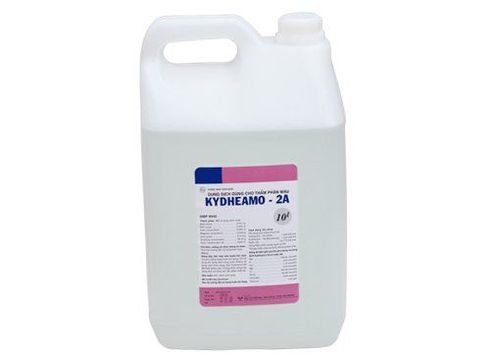This is an automatically translated article.
The article was professionally consulted by Doctor Nguyen Dang Tuan - Department of Intensive Care - Vinmec Times City International HospitalMercury poisoning can cause damage to the liver, brain, lungs, and nerves. Humans can experience acute or chronic mercury poisoning from exposure, ingestion, or inhalation of vapors of this metal.
1. What are the common causes of mercury poisoning?
Mercury is a liquid metal, insoluble in water and can easily evaporate at room temperature. Mercury poisoning (also known as mercury poisoning) is a form of metal poisoning caused by exposure to mercury in the elemental, volatile, or inorganic salts or organic compounds.
Humans can be poisoned with mercury after a period of exposure to this metal, possible forms of exposure include: gastrointestinal exposure from eating foods that naturally contain mercury in the salt form. inorganic or organic compounds such as longfin tuna (moon tuna), swordfish, shark, king mackerel and tilefish (especially caught in the Gulf of Mexico area);...; airborne exposure by inhalation of volatile mercury (converts to a vapor at room temperature), is the most hazardous and highly toxic form; exposure by direct skin contact (volatile mercury) or dental amalgam fillings, or exposure to ambient mercury (occupational, living near source of exposure).
In fact, the higher the fish in the food chain, the larger the predatory fish, living in the deep sea, the greater the accumulation of organic mercury in them or shell foods such as some snails .
In today's increasingly modern life, exposure to mercury is also quite common due to the working environment, or worse, due to an accident that causes leakage, vaporization and release of this metal into the surrounding environment. from industrial raw materials that contain mercury, such as thermometers, manometers, manometers, float valves, mercury switches, mercury relays, fluorescent lamp manufacturers, and others. .
2. Body signs of mercury poisoning

After acute exposure to mercury through the skin, humans experience acute mercury poisoning on the skin such as paresthesia or itching, burning, swelling, pain, or feeling like small insects crawling above or below. skin, skin discoloration, and skin peeling.
If acute mercury exposure is through the air (inhalation of mercury gas) or by mouth, the person who is poisoned may have symptoms of profuse sweating, tachycardia, increased salivation, and increased blood pressure. pressure. Children with botulism may have red cheeks, nose and lips, loss of hair, teeth and nails, short-term skin rashes, muscle weakness, and increased sensitivity to light. The explanation for this phenomenon is that mercury irreversibly inhibits the enzyme (COMT - catechol O methyl transferase) required for the catabolism of catecholamine (which is a neurotransmitter).
Children with mercury poisoning may show red cheeks, nose and lips; loss of hair, teeth and gums, transient rash, muscle weakness and increased sensitivity to light, in addition possible renal dysfunction or neuropsychiatric signs such as emotional loss, memory loss or insomnia .
3. What diseases does mercury poisoning cause?
Mercury is a less toxic (liquid) element, but its gaseous form and its organic compounds and inorganic salts are extremely toxic. This is the cause of brain and liver damage when people touch, breathe or ingest.
One of the most toxic compounds is Dimethyl mercury, so toxic that just a few microliters on the skin can cause death. High-level exposure to methylmercury is known as Minamata disease , the mechanism of which is because they attack the central nervous system and endocrine system, and also affect the mouth, maxillofacial muscles and tooth. Prolonged exposure causes brain damage and death. In pregnant women, exposure to methyl mercury can cause miscarriage, birth defects, and birth defects in the unborn baby.
Mercury poisoning causes many harms to the body depending on the route of exposure:
Inhaling mercury causes acute severe lung disease, causing patients to have symptoms of cough, difficulty breathing, burning pain, a feeling of tightness in the chest. , possibly fever. These symptoms usually subside within a week. However, in some cases, the progression is more severe than acute pulmonary edema, respiratory failure, convulsions and death. Ingestion of foods containing organic mercury, most commonly in marine fish, causes chronic mercury poisoning. Symptoms usually appear after days to weeks depending on the amount of mercury absorbed by the body. Neurological manifestations are paresthesia, ataxia, patients with neurasthenia, hearing loss and dysarthria, narrowing of the field of vision, mental confusion, muscle tremors, movement disorders, and possibly even dead. Chronic poisoning by inhalation of mercury causes the classic triad: gingivitis and salivation, tremors, and neuropsychiatric disturbances. Children often lose sleep, forgetfulness, psychological instability, poor appetite, sadness. Ingestion of inorganic mercury causes burning of the oral mucosa, abdominal pain, nausea, vomiting blood. This case is usually only seen in children when naughty accidentally swallowed the watch battery. After a few days, the disease can turn into acute tubular necrosis, causing kidney failure, fluid and electrolyte disturbances that can be fatal.

Please dial HOTLINE for more information or register for an appointment HERE. Download MyVinmec app to make appointments faster and to manage your bookings easily.














